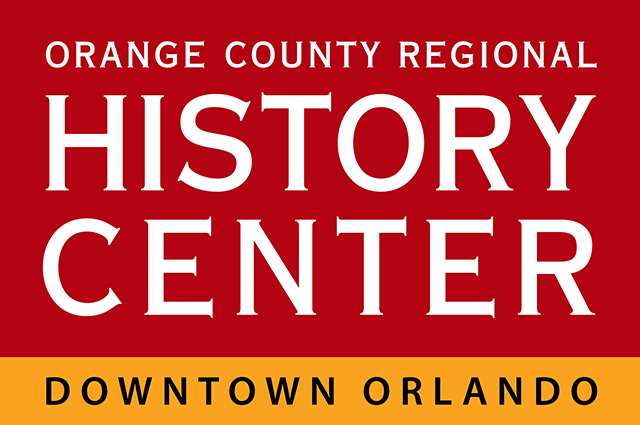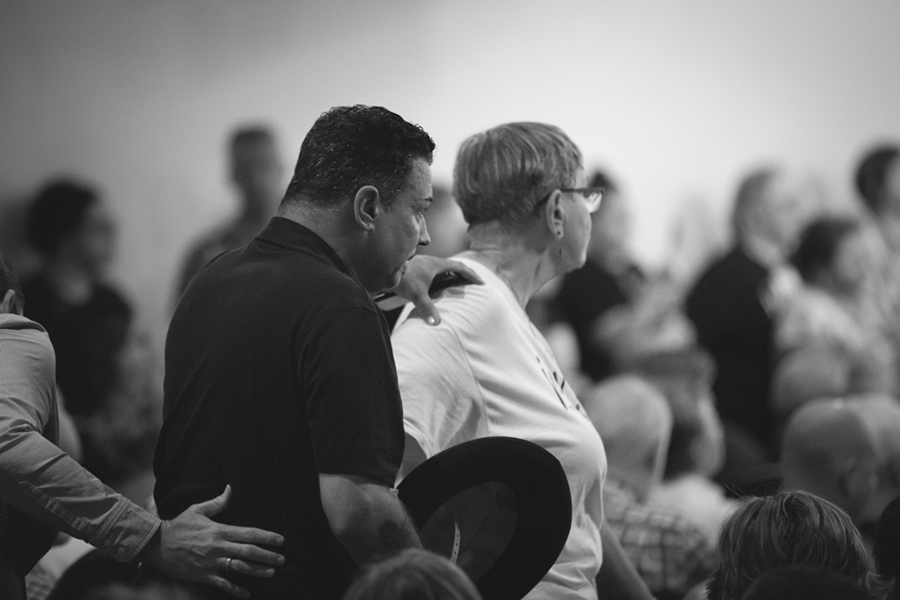By Hannah Thompson
2021 Oral History Intern, University of South Carolina
This is part two of two posts focusing on religious response to the Pulse nightclub shooting and featuring oral histories from the History Center’s collection.
Following the Pulse nightclub massacre on June 12, 2016, much of the faith community in Central Florida quickly moved to support the vibrant Orlando LGBTQ+ community. Like so many other faith leaders, the Rev. Terri Steed-Pierce jumped into action to assist the victims of the shooting and their families, mostly through moral and spiritual support, by holding vigils and memorials and offering space for counseling groups to gather. However, there is one distinct difference between Steed-Pierce and her colleagues: she is the gay pastor of the gay church.
Steed-Pierce grew up in Charlotte, North Carolina, where she was an active member of Midwood Baptist Church. After feeling called to the ministry in high school, she attended Mars Hill College and then continued her education at Southeastern Baptist Theological Seminary in Wake Forrest, North Carolina. When she came out as a lesbian in her first year at seminary, it took a toll on her personal relationships.
After graduating in 1991, Steed-Pierce worked for an ophthalmologist for sixteen years. In 1994, she found the Metropolitan Community Churches (MCC), where she immediately felt at home. She took on increasing leadership roles throughout the 1990s and early 2000s, before her ordination in 2007, when she took a position in Charleston, South Carolina. After moving around for a few years, she came to Joy Metropolitan Community Church in Orlando, where the congregation voted her its new pastor in 2012.
Joy MCC is part of the Metropolitan Community Churches across America, congregations that actively promote acceptance and understanding around issues of sexuality, gender, and race, to name a few key initiatives. Founded in Los Angeles in 1968 by the Rev. Troy Perry, Metropolitan Community Churches are among the nation’s most progressive, and MCC clergy were the first to officiate at gay marriages. Perry’s church renounced him for being gay in the 1960s. In response, he preached out of his own home, starting with only a handful of congregants. Now, there are Metropolitan Community Churches across the country.
Given the faith community’s eagerness to assist with the aftermath of the Pulse shooting on June 12, 2016, it came as a shock to Steed-Pierce that other faith leaders didn’t inform her church about the multitude of interfaith vigils, memorials, and events they were planning in the days following the massacre. After Orange County Mayor Teresa Jacobs invited Steed-Pierce to a press conference on June 15 and gave her the opportunity to speak, Steed-Pierce addressed the other faith leaders in the room, as she recalled in her oral history:
“ ‘Invite us to the table.’ I said, ‘I’m the gay pastor of the gay church, . . . so invite us to the table.’ ”
In Steed-Pierce’s eyes, the lack of the interfaith community’s inclusion of a gay faith leader and a gay church in response to a massacre at a gay nightclub spoke volumes. However, following her remarks at the press conference, several other faith leaders finally reached out to her about how to be better LGBTQ+ allies. At the same time, a number of leaders also offered up problematic interactions, furthering the complicated history between many religious groups and the LGBTQ+ community. She recalled one particular exchange following the press conference:
“He said, ‘Let’s get together sometime because I really just want to know more. I want to talk to you, I want to, I just want to understand. So, let’s have coffee.’
I said, ‘I would love to.’ And he said, ‘Cause you know, I’m a sinner too.’
And I was like, there’s the problem. And I put my hand out and everything. Now, everybody’s looking at us. I said, ‘There’s the problem. What I do – who I am, what I do – is not a sin, there’s not –,’ [and] he’s like, ‘okay, okay, okay, I just, I just want to understand, I’m not trying to be offensive, I just want to understand.’
Anyway, so, this producer walked up to me and she said, ‘Can I talk to you?’ . . . So I walked over to my left to the young lady – she was really sweet, and she said, ‘Oh, I’m so glad, I wanted to talk to you, I’m so glad,’ and she said ‘How are you?’ And I said, ‘I’m upset.’ And she said, ‘Yeah, I know.’ And I said, ‘Honestly, I’m mad.’ And she’s like, ‘Yeah, I know.’ And I said, ’To be real honest, I’m pissed off.’ And she said, ‘That’s exactly why I wanted to talk to you.’ And she said, ‘Did he call you a sinner?’ And I said, ‘Exactly.’ And I said, ‘Here’s the problem.’ . . . You know, people need to see this happens to us every day. You know, this is the kind of conversation we have every single day.”
Steed-Pierce recalled sitting down with many other faith leaders, most notably Dr. Joel Hunter, following the massacre and the press conference. Hunter, then known for being the conservative senior pastor at Northland Church, realized following the shooting that he did not have many connections with the LGBTQ+ community. He sought to rectify the situation by connecting with Steed-Pierce and other LGBTQ+ community leaders. The two formed a friendship, and Hunter invited Steed-Pierce to a Reformation Project event, “Elevating the Dialogue,” that encouraged communication and support between the LGBTQ+ community and faith communities. Hundreds of people attended the workshop, but it was not well received amongst all evangelicals.
To Steed-Pierce, her willingness to engage in open conversations with other faith leaders serves as a reminder about the unity of one community. The concluding words from her oral history are powerful ones:
“My hope is that from this moment on, from this tragedy, we recognize the immense and inherent worth of all God’s children, and that we, every single person has worth and intrinsic value and, regardless of what the community says or how the community might change and turn back to a level of hatred, that people would know – particularly those people who identify as outcasts, for those who have been leveled on the periphery for so many years – that God is a god of love and loves you and loves everybody and God will continue to work from this horrible tragedy incredible good. And I pray that they’ll see it and they’ll look back at this time and realize, ‘Gosh, look at what God can do.’ ”


